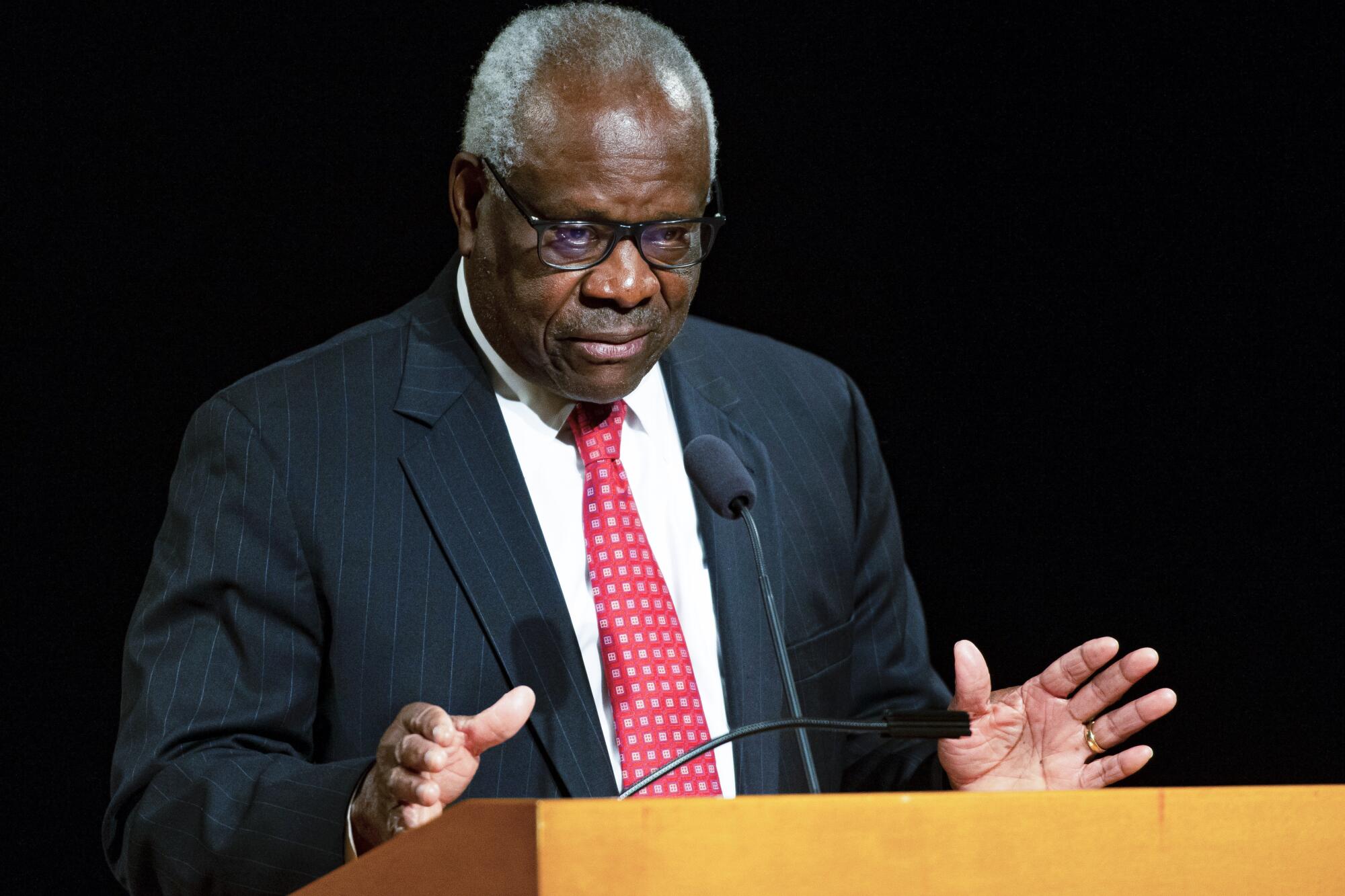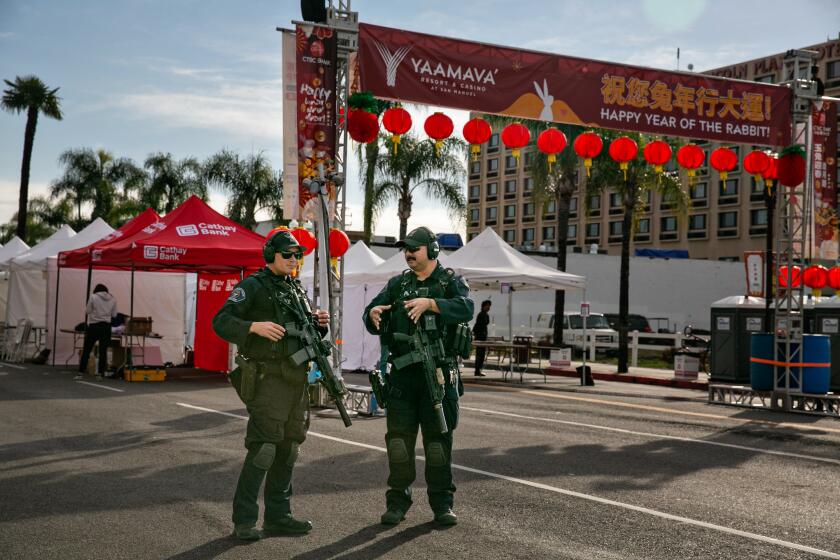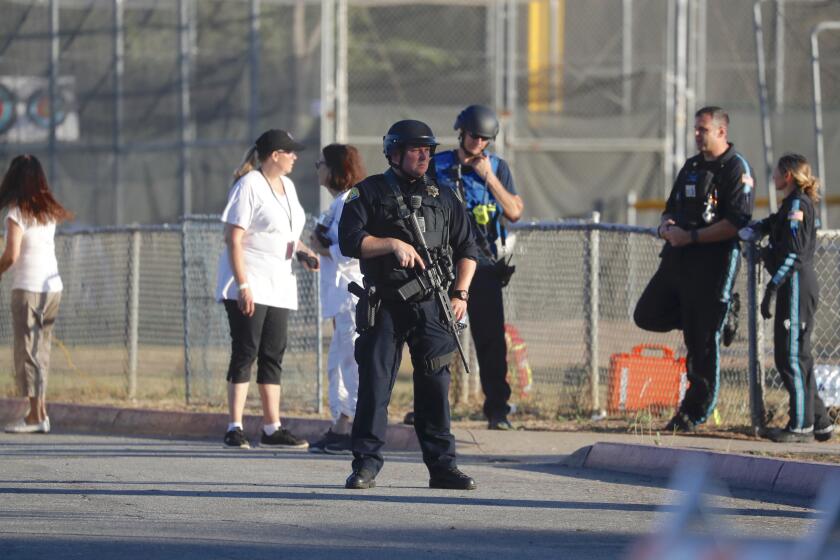
- Share via
WASHINGTON — It wasn’t until 2008 that the Supreme Court for the first time struck down a gun control law, ruling the 2nd Amendment protected the “right of law-abiding, responsible citizens” to keep a handgun at home for self-defense.
Last year, the court went a step further and said an “ordinary law-abiding citizen” also has a right to a state permit to carry a concealed weapon in public for self-defense.
Now the justices face a new frontier: Do gun rights extend to dangerous people and dangerous weapons?
- Share via
An opinion by Supreme Court Justice Clarence Thomas could extend gun rights to some people previously deemed too dangerous to have guns, and could hinder blue states like California from imposing a ban on assault rifles.
In just the last year, accused criminals and felons including drug dealers and domestic abusers have won gun rights claims by arguing that in 1791, when the 2nd Amendment was adopted, the new nation did not have broad restrictions on firearms.
They owe their success to conservative Justice Clarence Thomas and the opinion he wrote for a 6-3 majority in the 2022 case of New York State Rifle & Pistol Assn. vs. Bruen.
A self-proclaimed champion of “originalism,” Thomas said the court should focus strictly on the “text and history” of the Constitution when considering the legality of gun control laws.
“The Second Amendment does not permit — let alone require — ‘judges to assess the costs and benefits of firearms restrictions,’” he wrote. Instead, when facing a gun rights claim, “the government must affirmatively prove” the restriction is “consistent with this Nation’s historical tradition of firearm regulation.”
Since then, federal prosecutors have struggled to defend laws that deny guns to those accused of domestic violence or convicted of felonies.
The Thomas opinion has “led to chaos and uncertainty and wildly contradictory decisions from federal judges,” said Eric Tirschwell, executive director of Everytown Law, which defends gun control laws. “It has opened the floodgates for new challenges to just about every gun safety law on the books.”
::
Also at stake are bans on assault weapons and large-capacity magazines and a variety of other gun control measures in California and other blue states.
Even after establishing individuals’ gun rights in 2008, the high court routinely turned away 2nd Amendment challenges to local and state bans on assault weapons, with only Thomas and the late Justice Antonin Scalia, a fellow conservative, in dissent.
But gun rights advocates, encouraged by the court’s addition of three new conservative justices during the Trump administration and last year’s opinion in the New York case, have renewed their challenges. An appeal raising this issue could reach the high court later this year or early next.
“I like the composition of the court for our side,” said Kostas Moros, a gun rights lawyer who has represented the California Pistol & Rifle Assn.
Key questions for the court will be how far individual 2nd Amendment gun rights should go and what type of weapons are protected.
In its 2008 opinion, the Supreme Court said the 2nd Amendment protects the right to firearms that are “in common use,” but not the “carrying of dangerous and unusual weapons.”
State attorneys have said that semiautomatic rapid-fire rifles like the AR-15 are uniquely dangerous and can be banned.
But gun rights defenders argue that these rapid-fire weapons are in common use. The National Shooting Sports Foundation has estimated Americans own 22 million of them.
Because federal appeals courts have yet to rule on the new challenges, the justices are not likely to hear an assault weapons case until next year. Last month, the U.S. 7th Circuit Court in Chicago heard arguments over an Illinois ban, while California attorneys are awaiting a ruling from a federal district judge in San Diego.
California already has the strictest gun laws in the nation, but Democrats in Sacramento say more are needed.
::
But the Supreme Court has agreed to reconsider its approach to gun rights this fall in a domestic violence case from Texas that may determine whether even dangerous people retain the right to carry a weapon.
The defendant in the case won a 2nd Amendment claim even though police alleged he was a drug dealer who had shot at people and cars five times within a month in December 2020.
They said Zackey Rahimi had used an AR-15 to fire shots into the house of a man who he said had been “talking trash” about him on social media. He also fired shots at a driver after getting into an auto accident, and shot wildly into the air “after a friend’s credit card was declined at a fast-food restaurant,” prosecutors said.
When police in Arlington, Texas, went to arrest Rahimi, they found a .45-caliber pistol, a .308-caliber rifle, magazines for both pistols and rifles, ammunition, approximately $20,000 in cash, and a signed copy of a court restraining order that prohibited him from having firearms.
The Violence Against Women Act of 1994 said judges may enforce restraining orders that take away firearms from someone who has harassed or threatened an “intimate partner” or a child, and who poses a “credible threat.”
A year before the five shooting incidents, Rahimi was brought before a local judge because he had beaten and threatened a girlfriend who’d had a child with him. He grabbed her in a parking lot, forced her into his car and shot at a bystander who saw what happened. He later threatened to kill the woman if she reported the assault.
The judge issued a restraining order for two years that denied Rahimi the right to have firearms, and warned him he would be guilty of a federal crime if he defied the order. He agreed, but then defied the order, including by threatening the woman again.
He was indicted by a federal grand jury, pleaded guilty to violating the restraining order and was sentenced to six years in prison.
In March, the conservative 5th Circuit Court of Appeals ruled for Rahimi, overturning his conviction and declaring unconstitutional the part of the federal law that denied guns to those accused of domestic violence.
The three-judge panel, which included two Trump appointees, agreed it was laudable to “protect vulnerable people in our society,” but said “the Government fails to demonstrate that [the law’s] restriction of the Second Amendment right fits within our Nation’s historical tradition of firearm regulation,” and “the Supreme Court has made clear that ‘the Second Amendment right is exercised individually and belongs to all Americans.”
Therefore, the panel concluded, “Rahimi, while hardly a model citizen, is nonetheless among ‘the people’ entitled to the Second Amendment’s guarantees.”
::
President Biden’s Solicitor Gen. Elizabeth Prelogar moved quickly to appeal the ruling to the Supreme Court.
“Tens of millions of Americans ‘will, in the course of their lifetimes, be the victims of intimate-partner abuse,’” she told the court. “And the presence of a gun in a house with a domestic abuser increases the risk of homicide sixfold.”
Contrary to the 5th Circuit, Prelogar argued that the 2nd Amendment allows the government “to disarm dangerous individuals — that is, those who would pose a serious risk of harm to themselves or to others if allowed to possess a firearm.”
California Gov. Gavin Newsom filed a friend-of-the-court brief in April urging the justices to reverse the 5th Circuit’s decision.
The ruling “threatens the lives of countless Americans, enabling entirely foreseeable acts of gun violence. Approximately one in five homicide victims in the United States are killed by an intimate partner,” he said.
The governor noted that California had expanded use of gun violence restraining orders — so-called red-flag laws — that allow police, family members and others to obtain court orders that temporarily take guns from someone who poses a threat to themselves or others.
But those laws and court orders would be at risk of being struck down if the 5th Circuit’s broad view of gun rights were upheld.
California’s “red flag” law appears to have a role in reducing the chance of mass shootings, says a study by the UC Davis School of Medicine.
On June 30, before adjourning for a summer recess, the Supreme Court agreed to hear the case of United States vs. Rahimi in the fall.
UCLA law professor Adam Winkler said the domestic violence case from Texas “is the best case to go before the court for the government.”
The Thomas opinion had made it very difficult for prosecutors to defend modern gun laws such as those dealing with domestic abuse because there were no such laws in the 18th century, Winkler said. But the Rahimi case highlights the conflict between the court’s claim that the 2nd Amendment protects “law-abiding and responsible citizens” and its opinion in the New York case that appears to have given gun rights even to defendants who have shown themselves to be dangerous and irresponsible.
::
The wave of successful gun rights claims goes far beyond domestic violence.
Taking their cue from the Thomas opinion, judges also have thrown out laws that help police track guns that are used in crimes. In October, a federal judge in West Virginia invalidated a law that makes it a crime to “remove or obliterate” the serial numbers on a gun.
Randy Price, the defendant in that case, had been convicted in Ohio of aggravated robbery and manslaughter, and was carrying an unmarked pistol when he was arrested for a traffic violation in West Virginia.
U.S. District Judge Joseph Goodwin said the “government has presented no evidence any such requirement [for serial numbers] existed in 1791.”
While “firearms with an obliterated serial number are likely to be used in violent crime and therefore a prohibition on their possession is desirable,” Goodwin said, “that argument is the exact type of means-end reasoning the Supreme Court has forbidden me from considering.”
Last month, a federal judge in Mississippi threw out a “felon in possession” charge against Jessie Bullock, a man who had been convicted decades ago and served 15 years in prison for aggravated assault and manslaughter.
U.S. District Judge Carleton Reeves, an Obama appointee, has been an outspoken critic of the conservative high court and the doctrine of originalism, but said his duty was to follow the law.
“The standard announced by the Supreme Court in Bruen is the law of the land. It must be enforced. Under that standard, the government has failed to meet its burden,” he wrote in U.S. vs. Bullock. “The federal felon‐in‐possession ban was enacted in 1938, not 1791 or 1868 — the years the Second and 14th Amendments were ratified.”
He said the government had pointed to no evidence “from either era supporting the categorical disarmament of tens of millions of Americans who seek to keep firearms in their home for self‐defense.”
The outcome in the dispute over the scope of the 2nd Amendment will probably turn on conservative Justices Brett M. Kavanaugh and Amy Coney Barrett.
Last year, when the court struck down the New York law on concealed-carry permits, Kavanaugh wrote a concurrence with Chief Justice John G. Roberts Jr. that sent a different message than the Thomas opinion.
“Properly interpreted, the Second Amendment allows a ‘variety’ of gun regulations,” he said.
The government also pointed to a dissent Barrett had written when she was an appeals court judge. Though she said she would have restored gun rights to a Wisconsin man who had been convicted of Medicare fraud years before, she said that was only because his crime was nonviolent and he was deemed to be not dangerous.
“History is consistent with common sense,” she wrote. “It demonstrates that legislatures have the power to prohibit dangerous people from possessing guns.”
More to Read
Sign up for This Evening's Big Stories
Catch up on the day with the 7 biggest L.A. Times stories in your inbox every weekday evening.
You may occasionally receive promotional content from the Los Angeles Times.














